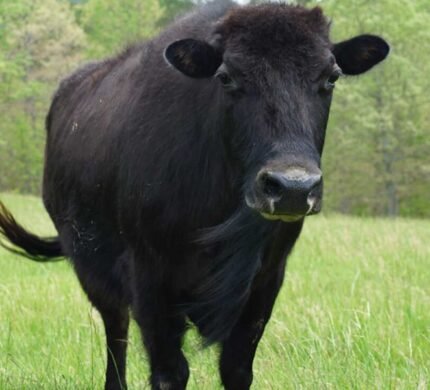Beefalo
- Temperature:100.4F to 102.8F degrees
- Milk:2,000 and 5,000 milk per lactation
- Food:Pasture grasses, Hay, Fibrous plants
- Pregnancy:280-290 days
- Nationality:Canada, and Australia

General Information
Beefalo is a hybrid breed of domestic cattle and American bison. The breed was developed in the United States in the mid-20th century with the goal of creating a hybrid that combined the hardiness and disease resistance of the American bison with the meat quality and production of domestic cattle.
They are primarily raised for their meat, which is known for its leanness and tenderness. Beefalo meat is lower in fat and calories than traditional beef, but still has a rich, meaty flavor.
They are not considered to be a threatened or endangered species, but conservation efforts are in place to maintain the genetic diversity of the breed.
Where we find this cow to buy?
Beefalo can be found for sale through a variety of sources, depending on your location and the availability of the breed in your area. Here are some potential options:
01. Local Cattle Breeders : The best place to start your search for Beefalo may be with local cattle breeders. Look for breeders who specialize in hybrid breeds or bison breeds, as they may have Beefalo available for sale.02. Livestock Auctions : Livestock auctions can be a good place to find Beefalo, as well as other breeds of cattle. Check local listings for upcoming auctions in your area.03. Online Livestock Marketplaces : There are a number of online marketplaces that connect buyers and sellers of livestock, including Beefalo. Some popular options include Livestock Of America, Ranch World Ads, and Cattle Range.

How to increase milk production in Beefalo
To increase milk production in Beefalo, there are a number of factors to consider. Here are some strategies that may help to improve milk production in Beefalo cows:
01
Nutrition is essential for milk production, and it is important to work with a nutritionist or veterinarian to develop a feeding plan that meets the specific needs of your Beefalo cows.
02
Selecting Beefalo cows with strong milk production genetics can also help to improve milk production in your herd. Work with a breeder or geneticist to identify animals with desirable milk production traits.
03
Effective management practices can improve milk production by ensuring cows have access to clean water, shelter, and sanitation, and are milked regularly and at consistent intervals.
04
Hormonal treatments may be used to increase milk production in Beefalo cows, but only under the guidance of a veterinarian or reproductive specialist due to potential health risks and side effects.
Medicine
Here are some common medications that may be used for Beefalo cattle:
01
AntibioticsAntibiotics are used to treat bacterial infections in Braford cattle, such as pneumonia and mastitis.
02
DewormersDeworming medications treat internal parasites in cattle, improving health and milk production.
03
VaccinesVaccines are used to prevent infectious diseases in Braford cattle, such as BRSV, IBR, and brucellosis.
04
NSAIDsNSAIDs can be used to reduce inflammation in cattle with lameness or mastitis.
Pregnancy
Providing a balanced diet with adequate amounts of protein, energy, and minerals is essential for the health of the fetus and mother.
Regular veterinary care is important during pregnancy to ensure that the beefalo is healthy and to monitor the progress of the pregnancy.
Adequate exercise is important for the health of the beefalo and can help prepare the mother for giving birth.
It’s important to make sure that the beefalo is up to date on all necessary vaccinations before and during pregnancy.
Important!
It’s essential to monitor Braford cattle closely during pregnancy to ensure that they are healthy and that the fetus is developing normally. Regular veterinary check-ups and ultrasound examinations can help detect any potential issues and allow for timely intervention if necessary. Additionally, it’s crucial to provide the cow with a comfortable and clean environment to minimize stress and reduce the risk of complications during pregnancy.
Food
Beefalo are hybrid animals that are a cross between domestic cattle and American bison. As a result, they have similar nutritional requirements to cattle and bison. A balanced diet is essential for the health and well-being of beefalo. The following are some examples of foods that can be included in a beefalo’s diet:
High-quality hay is an essential part of a beefalo’s diet. Timothy, brome, and orchard grass hay are good options.
They need access to grazing pasture that is rich in nutrients. Fresh green grass provides essential nutrients such as protein and fiber.
Corn, barley, wheat, and oats can be added to a beefalo’s diet to provide additional energy and protein.
Fermented hay and grass, also known as silage, can provide additional nutrition to a beefalo’s diet.
Facts
Here are some facts about Beefalo:
They can reach 55 inches in height and 1.500 to 2.000 pounds of weight.
They can reproduce until 25 years, while domestic cows have 8-10 years.
Young beefaloes are more resilient and healthier than domestic cattle.
Increased interest in beefalo breeding has reduced American bison herds to 4 herds.
They can be produced naturally or artificially (via insemination or insertion of fertilized embryo).
Beefalo is small at birth, but grows quickly and reaches a weight of 800-900 pounds by 10-12 months.
Beefalo is covered with fine, usually dark-colored robe that is evenly distributed on the body.
They has a higher tolerance to diseases and ability to survive in cold climates than domestic cattle.